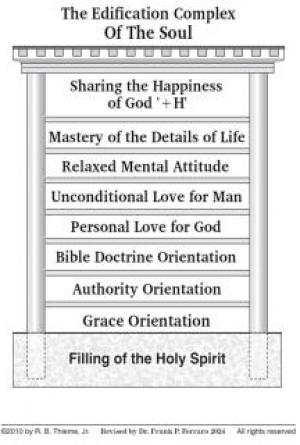{1} Especially vv11,12,15 &30
{2} Greek: to euaggelion mou – Rom2:16; Rom16:25; 2Tim2:8
{3} Col1:26,27
{4} Rom8:29
{5} Greek: ploutos
{6} Rom11:11-12
{7} Rom11:30
{8} Or “administration” (Greek: oikonomia) – textual variant utilized in some Bible versions
{9} Eph3:1-12
{10} Mt19:28
{11} Acts1:26
{12} 1Cor15:8
{13} Acts11:17,18
{14} Jn17:3
{15} Jn6:54
{16} 1Jn3:15
{17} Jn6:57a
{18} Jn6:57b
{19} Acts11:1-18
{20} Gal2:11-14
{21} Lk19:42-44
{22} Mt24
{23} Acts13:40-41
{24} Acts2:23; Is53:5
{25} Paul’s references to “God” always refer to the Father. The economy of the Godhead is a mystery but the Father’s monarchical status is a biblical reality that needs to be recognized in order to understand aspects of what is being presented in this document, in particular the fact that the timing of events is under the Father’s authority (Mk13:32; Acts1:7; Eph3:9; Rev1:1)
{26} Acts13:46,47
{27} Jer2:3 cf. Jam1:18
{28} Rom4:13
{29} Zech13:1
{30} Is2:4; Mic4:3
{31} Acts1:6
{32} Acts18:6
{33} Rom11:11
{34} Heb12:24 cf. Heb10:29
{35} Acts6:8
{36} Acts3:24
{37} E.g. Gen6:7; Gen18:21,26; Ex32:14; 1Sam15:11,35; Mt2:19-22
{38} Is2:1-4
{39} Is60:3
{40} Zech8:23
{41} Rom11:11-13,30
{42} Heb10:4 Greek “aphairein”
{43} Zech13:1
{44} cf. 1Pet1:9
{45} Jn17:3
{46} Rom7:24
{47} Jer2:3
{48} Rom8:17 (cf. Greek); 1Pet5:10; 2Thes2:14
{49} Mt15:22-26
{50} cf. Mt10:5-6
{51} Mt21:43
{52} Rom11:24
{53} Rom15:8-9
{54} Acts26:18
{55} Mt24:14
{56} Col1:27
{57} Acts11:17-18
{58} Mt21:43
{59} Mt22:1-10
{60} Eph1:4-5
{61} Because Pelagius came to be denounced as a heretic little of his work remains. We are largely reliant on Augustine’s account of his teaching and manner of life, the latter of which even Augustine acknowledged to be saintly. As Wikipedia affirms (https://en.wikipedia.org/wiki/Pelagius), more scholars are coming to the view that this British theologian had been more faithful to the teaching of the earliest fathers than had previously been asserted.
{62} De Civitate Dei (The City of God) Book XXI http://www.newadvent.org/fathers/120121.htm
{63} Letter to Corinthians of Clement (c. AD30-AD100) chaps. 19 & 20
{64} “The Instructor” Book 1 chap. 3
{65} The first apology of Justin chaps. 43 & 46
{66} ibid. chap. 10
{67} Irenaeus against heresies Book III chap. 25 (para 1)
{68} Ibid. Book IV chap. 13 para 1
{69} Greek: ek pisteos christou
{70} Jer9:24
{71} Titus3:4 Greek “philanthropia”
{72} Augustine interpreted 1Jn4:7 to mean that only a baptized Christian has the capacity to love since love is from God and no one outside the Catholic Church could be “born of God”. Augustine’s teaching that man is innately incapable of love also affirmed in Anti-Pelagian writings; “On grace and free will” chap.37
{73} 1Cor13:5
{74} Latin: paena sensus . (cf. New Advent: Catholic Encyclopaedia under headings “Unbaptised infants”, “Limbo” and the “Teaching of St Augustine”).
{75} (De Civitates Dei XXI chap. 12)
{76} Eph5:1
{77} Writings of the 2nd and 3rd century Church Fathers alongside that of 4th/5th century Augustine’s can be examined at http://www.newadvent.org/fathers/.
{78} More especially Evangelical Calvinists. Today, watered down (moderated Calvinist and Arminian) versions of the “Good News” are more often presented, the problem being they move still further away from the biblical realities of predestination and the exclusive, privileged nature of those who shall become the corporate Bride of Christ.
{79} “On Rebuke and Grace” – chap. 3
{80} On Grace and Free Will” Chap. 7
{81} Origen de Principiis Book II chap. 5 para3
{82} E.g. Is1:17; Zech8:16-17
{83} Augustine - Anti-Pelagian writings “On the spirit and letter” chaps. 22 & 27
{84} Is58:5-12
{85} Augustine: “Against two letters of the Pelagians” Book III chap. 11
{86} Mt13:17
{87} 1Pet1:9-12
{88} Augustine - Anti-Pelagian writings “On the spirit and letter” chaps. 22 & 27
{89} Ezek18
{90} Two years before his conversion Augustine had been appointed Professor of Rhetoric at the Imperial Court of Milan
{91} Cf. Acts10:34-35; Rev10:10 - koilos often translated as stomach is more likely to refer to the abdominal region (cf. Strong’s Greek 2836)
{92} Eph4:12-13
{93} Lk3:4
{94} Jn17:22-23
{95} Mal4:5-6; Lk1:17
{96} Is9:7
{97} Mt24:15
{98} Dan11:31
{99} Mt24:15; Mk13:14: A unique asseveration; usually Jesus would say, “He who has ears let him hear”. The comment is unlikely to have been added by the synoptic gospel writers to draw attention to their own text which itself would be an unparalleled occurrence within a gospel narrative. It was therefore Jesus’ warning and He would appear to have had future readers of the Scriptures in mind.
{100} Cf. Dan12:11
{101} Cf. Dan12:1; Mt24:21-22
{102} Daniel’s “perpetual sacrifice” as understood to be referring to the Holy Eucharist affirmed in Hippolytus’ “Fragment from Commentaries” “On Daniel” 2nd fragment (para 22)
{103} Dan12:11
{104} Dan12:7 refer to Hebrew text
{105} Dan12:12
{106} Cf. Dan12:2
{107} Greek: musterion anomias 2Thes2:7
{108} Greek: apokaluphthesetai ho anomos 2Thes2:8
{109} Greek: apostasia 2Thes2:3
{110} Mt24:10-11
{111} Mt24:32-34
{112} Cf. Mk13:32 and Acts1:7
{113} Lk9:27
{114} Lk21:12
{115} Mt10:23
{116} Lk13:26
{117} Mt23:34
{118} Mt5:18
{119} Mt23:1-3
{120} Mt7:12
{121} Mt23:3
{122} Mt24:16-19
{123} Mt11:20-21
{124} Heb7:25-26
{125} Mt19:28
{126} Acts3:21
{127} Lk21:28
{128} Rev20:4-5
{129} Rom8:21
{130} Mt24:14
{131} Lk20:35
{132} Mal4:5-6
{133} Mt17:10-13
{134} Acts3:21; Rom8:21-22
{135} Mt11:14
{136} Lk1:14-17
{137} Jn1:21
{138} Mal3:1-5
{139} Phil4:3
{140} First epistle of Clement chap. 23
{141} Justin Martyr dialogue with Trypho chap. 49 (ignore editors’ heading – read text which entirely contradicts it)
{142} Lk1:17
{143} Is1:17-18
{144} Lk3:10-14
{145} Mt11:11
{146} Lk19:8-10
{147} I.e. “the body of this death” unlike the soul pertains to a temporary feature of a person’s journey through eternity although its corrosive impact upon the soul can have more enduring consequences (chapter 3)
{148} 1Pet4:6
{149} Jn1:9 (King James Version)
{150} 2Thes1:10
{151} Heb2:10-11
{152} Jn17:6
{153} Vatican II Lumen Gentium 16
{154} Cf. 1Pet5:10; Heb2:10
{155} Jn6:51
{156} Col1:15
{157} Gal6:14
{158} Jn12:31
{159} 1Tim2:4
{160} Gen21:8-20
{161} Eph2:8
{162} Rom5:18
{163} Cf. Jn15:2
{164} Mt25:45-46
{165} Gen4:7 King James Version
{166} 1Jn3:12
{167} Mt25:14-29
{168} 1Jn3:12
{169} Irenaeus against heresies book IV chap. 18 (3)
{170} E.g. Rom3:22; Gal2:16; Gal3:22
{171} E.g. Gal3:26
{172} Cf. Rom1:17 Faith applied to faith
{173} Gen15:5
{174} Mt9:13
{175} E.g. 2nd Apology of Justin Martyr (AD110-165) – chap. 5; Transgression of angels & Irenaeus against heresies Book IV chap. 36 (4)
{176} Jud1:14-15
{177} Enoch (Charles version) chap LXIX vv26-27 http://qbible.com/enoch/68.html
{178} Rev10:7
{179} Enoch1:1 https://sacred-texts.com/bib/boe/boe004.htm
{180} Enoch104 vv11-13 https://en.wikisource.org/wiki/The_Book_of_Enoch_(Charles)/Chapter_104
{181} 1Pet4:6
{182} Gen4:14
{183} 1Tim2:14-15 (verse 15 will make more sense once this document as a whole has been understood)
{184} Union with the Godhead
{185} Cf. 2Pet1:4
{186} Cf. Gen3:22
{187} Gen2:17
{188} 1Jn2:16
{189} 2Cor5:1; 2Pet1:13-14
{190} 1Thes4:4
{191} Irenaeus against heresies Book III chap. 23 (5)
{192} Origen de Principiis Preface (4)
{193} Prov2:13-15
{194} Mt25:31-46
{195} Jud1:12
{196} Cf. Rom7:23
{197} Mt23:15
{198} Col1:27; 1Jn3:2
{199} Gen4:11-14
{200} It has itself been lost or theologically eluded and it concerns “the lost” being the bulk of humanity and their individual acceptance or rejection in the eyes of God
{201} 1Thes4:4
{202} Gen9:1
{203} Gen17:20
{204} Gen21:20
{205} Jud1:11
{206} Explanation and historical background: https://en.wikipedia.org/wiki/Creationism_%28soul%29
{207} Catechi







